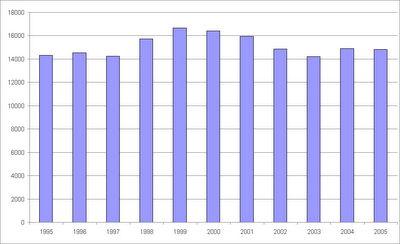Wired covers Swedish Pirate Party

(Disclaimer: I do believe in copyright. But…)
The latest issue of Wired covers the The Pirate Party in Sweden. Wired’s article is interesting and well written, but it needs some comments on the business side, the political side and the cultural side.
In my opinion The Pirate Party is mostly a cultural phenomenon in political disguise. Art have always at intervals protested against “the commercialization of society” claiming that “culture is free and belongs to the people”, or similar. Hugo Ball, one of the originators of the Dada movement, described in early 20th century Dada's mission as to “conceive everyday life in such a way as to retrieve it from its modern state of colonization by the commodity form.”
As a cultural protest against the establishment the Swedish Pirate Party is a bit like the spring revolt in France, 1968. In Paris students from the university of Sorbonne, intellectual leaders and artists protested against “the commercialization of mass culture”.
The cultural and political attitudes you find at the Pirate Party have much in common with the Paris spring protesters. The spring revolt was both a questioning of the prevailing cultural climate and a political criticism of society.
The Pirates are not kids or organized criminals, as the MPAA and RIAA insinuate. They are highly-educated, articulate individuals heavily influenced by thinkers such as Stanford professor and creator of the Creative Commons, Lawrence Lessig, or RMS, Richard M Stallman, the man behind Open Source, a person who lives strictly according to his beliefs, a man who values freedom over convenience, commerce and control.
The Pirate Party are opposed to piracy for commercial gain, but would like to reduce the scope of copyright to five years, after which any work would transfer into the public domain; non-commercial copyrights would simply be abolished.
Their vision or political agenda to decriminalize copyright infringement, abolish patents, and a rollback of the EU Data Retention Directive is of course a mere vision. That just won’t happened. But they are completely right about the big multinational music and film industry having change the copyright laws to their favor.
This is somewhat disturbing and affects not only democracy, but also all creative work: art, academic research and the whole innovation system that is of major importance for Swedish growth.
The large music and movie companies are publicly traded and thus driven by profit. And all commercial companies fight for monopoly. The record companies are no exception. And they have quite successfully carried through laws and regulations to their benefit. Especially in the Digital Millennium Copyright Act (DMCA).
Motion Picture Association of America MPAA demands government protection against a free market and global flows of information, like the proposed Consumer Broadband and Digital Television Promotion Act (CBDTPA) in 2002, which should have had require hardware manufacturers to prevent unauthorized digital reproduction or to embed "watermarks" on analog signals that originate from digital content.
They want the U.S. government to restrict the use of machines that Americans develop, make, sell, and use. And they have clearly tried influenced domestic politics in other countries.
But things have backfired. All the new copyright laws introduced the last ten years, both the U.S. Bills and the EU Directives, has been in the interest of the big record companies and not in the public interest.
Intellectual property, copyright, used to balance the public’s interests and private needs. It is supposed to be an economic incentive for the new producer, not a guarantee for the established.
Copyright is no longer negotiated through the market nor negotiated. It is directed by a handful of large established copyright holders.
The attitude is also clearly seen in their PR. The new rhetoric of copyright no longer reflects the original idea.
The Digital Millennium Copyright Act (DMCA) or the (EU) Directive 2001/29/EC have been complete failures. They have not limited the illegitimate digital distribution of copyrighted material. The laws has instead created a sense of censorship (and examples of real censorship). They have been used as a tools entirely for the big copyright holder to dictate the access, distribution and copying of information.
That have caused a big mistrust among especially music consumers. It is a direct consequence of misguided efforts to keep the control over a more or less outdated business model: selling music by the unit. Same thing with copy protection and digital rights management (DRM). There are not a single company that has made any money with selling music DRM solutions. (It killed the DAT technology). There are not a single consumer that see any benefit in DRM (if they know what it is). And if you know Google you soon know how to sidestep it.
Within copyright law (both U.S. and Swedish), there are four important safety measure that balance the censorious power of copyright. Fair use (“citaträtten”), the ability to use the portions of copyright material for various purposes of benefits to the public; The doctrine of first sale, which allows you to resell or led copyrighted material like a book or CD to whoever you want. Thirdly you cannot protect facts or ideas. And finally, there’s the idea of a public domain – the notion that copyright should only be executable for a limited period of time. (though different legal design in U.S. and Europe).
The democratic basis of copyright: The right to fair use, the doctrine of first sales, free share of facts and ideas, as well as the public domain, are thus dictated by those with money. It is deeply unethical that those with money decides over those without.
It’s not surprising there’s been a massive copyright revolt. We are eroding faith in the social contract of the copyright system.
There is lot to say about this, like why the concept of a public domain does not exist under Swedish copyright law. The moral rights – the paternity and the respect right – an originator has to his work(s) are indefinite. It is only the economic rights that have a time limit. Thus a copyright cannot ever fully lapse. The Copyright Act state that the moral rights to a work cannot be totally alienated, that is you cannot giveaway all of your copyrights.
And the information war begun with the rise of the peer-to-peer networks. Lawrence Lessig warned about this situation already in his influential work “Code and Other Laws of Cyberspace” from 1998.














